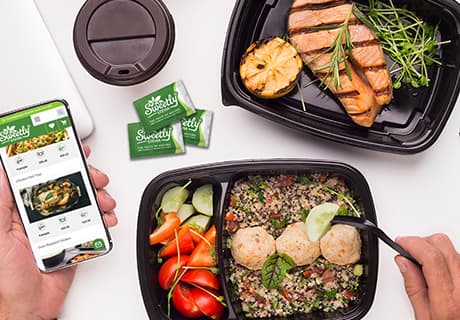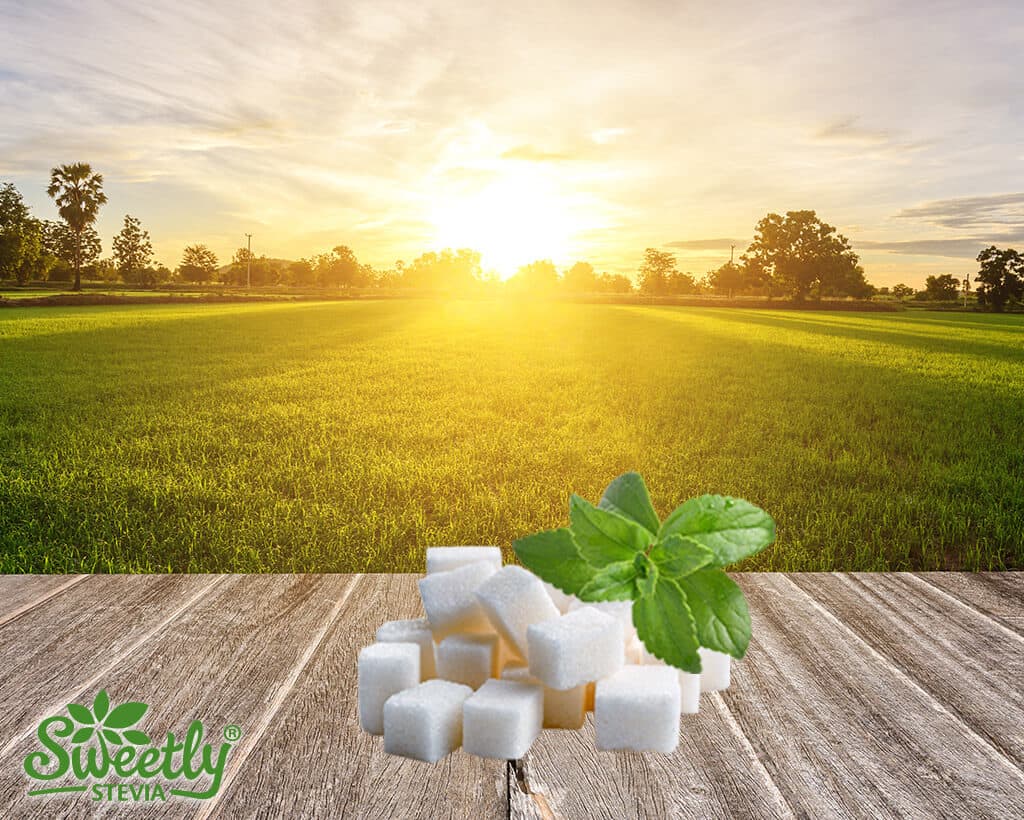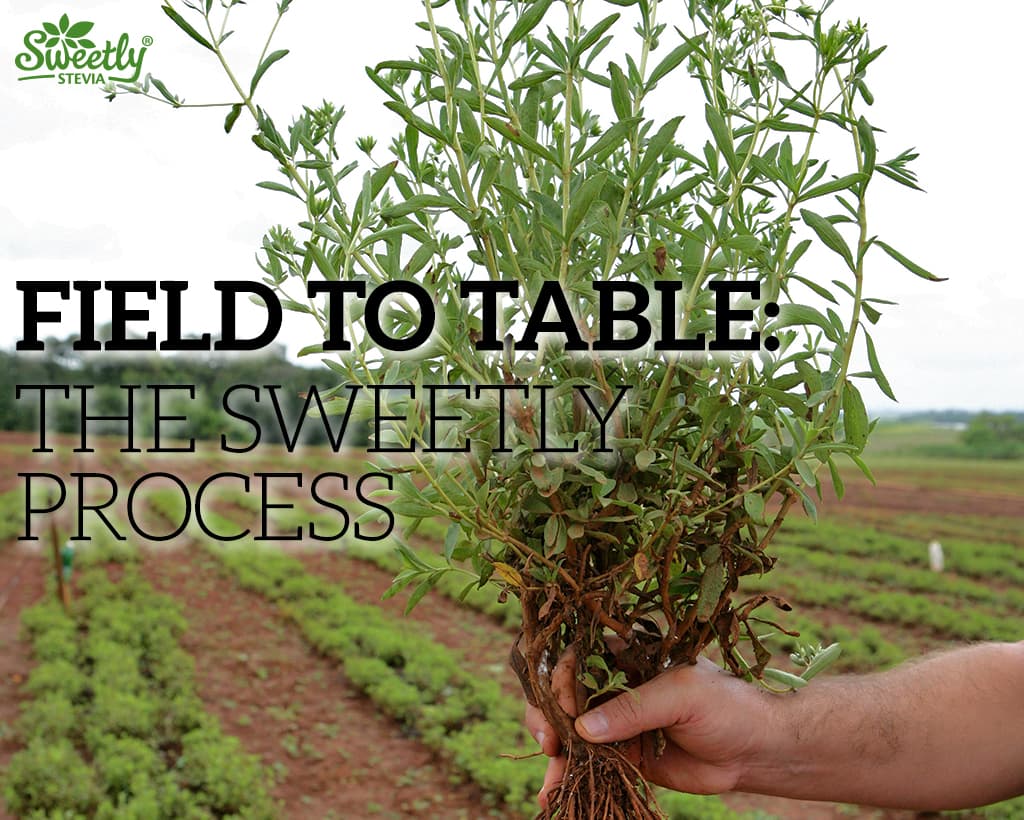Which All Natural Sweetener Is Best For You?

Do you crave sugar? We all have those moments. Whether you're hankering for a fast energy boost in the afternoon, stress-eating a pint of ice cream, or simply rewarding yourself with a sweet treat for a job well done, everyone has their own relationship with sugar. In its many forms, regular sugar contains a high amount of empty calories that can wreak havoc on your health if you consume too much of it daily. With regular sugar, corn syrup, and high-fructose corn syrup added to an abundance of packaged foods these days, it seems impossible to avoid this sweet, addictive substance.
Fortunately, there are many all-natural alternatives to sugar on the market today. But which all-natural sweetener is right for you? Let's take a look at the most popular options available and how they each compare to regular sugar.

Sugar Cane
Raw sugarcane is used for making just about every form of table sugar imaginable. Sugarcane stalks can grow to be as tall as 19 feet. These fibrous stalks are stout, jointed, and contain nutritious juice within. This juice, known as raw sugarcane juice is free of fat, cholesterol, protein, and sodium, yet rich in vitamin C, vitamin B12 (riboflavin), magnesium, iron, potassium, and phosphorus, all of which are highly beneficial to the body. The problem, however, is that by the time sugarcane finds its way to your table, it has been stripped of all of this nutrition and the only element left is highly caloric—sugar carbohydrates.
But don’t give up on sugarcane just yet! It’s still possible to find raw sugarcane that has retained a lot of its original nutrition. Even so, you’ll want to be mindful when using this all-natural sweetener, because a single serving contains 4 grams of carbohydrates in the form of glucose and fructose, which will have an impact on your blood sugar levels, as well as your fitness efforts.

Agave Nectar
Considered one of the sweetest all-natural sweeteners in the world, agave nectar comes from the blue agave plant and it isn’t technically a “nectar” but rather a “syrup”. Don’t worry, even though this sweetener comes from the same plant that is used to make tequila, it won’t get you—or your kids—drunk! It could, however, get all of you a little hyper. Packing a whopping 4.7 grams of sugar in a single teaspoon, this sweetener is extremely high in natural fructose. In fact, in terms of its density, it contains more fructose than high-fructose corn syrup. For this reason, agave nectar can be used sparingly and still be very flavorful, but if you aren’t careful, overuse of this sweetener could lead to weight gain and obesity. Despite this, because agave nectar is high in fructose and not glucose, it actually has a very low impact on blood sugar and won’t trigger a spike of insulin, which makes it a reasonable choice for people with diabetes and pre-diabetes.
If you’re watching your waistline, try not to let the high sugar content of agave nectar scare you off just yet. This sweetener comes with potential benefits, as well, the first of which is that it provides far more nutrients than regular sugar that’s derived from sugarcane. In fact, agave nectar is chalk-full of antioxidants, which are known to bind to those destructive free radicals floating around in our bodies.

Coconut Sugar
Coconut sugar has the same amount of calories and sugar carbohydrates—glucose and fructose—as table sugar derived from sugarcane. However, because it’s unrefined, its able to retain all of its vitamins and minerals by the time it reaches your cup or plate, which makes it a healthy alternative. It’s so similar to regular sugar, in fact, that if you use it to substitute sugar for your baking and sweetening needs, you can use a 1 to 1 replacement ratio, which makes coconut sugar a great option. But for those with dietary restrictions and diabetes, you’ll still need to limit your use of coconut sugar since it will spike insulin and lead to weight gain if strict moderation protocols aren’t in place.
That being said, this brown, granulated sweetener is high in antioxidants, iron, calcium, and potassium, and since it isn’t processed and comes straight from nature, you can feel confident that you’re choosing a healthier option than table sugar when you incorporate coconut sugar into your diet.

Honey
Since ancient time, honey has been used as both a food and a medicine. Today, eating raw honey that’s local to where you live is said to provide your immune system with the right nutrients to combat a histamine reaction during pollen season. Why? Because honey is made from plant pollen thanks to honeybees and all their hard work! The smell, color, and even the taste will depend on the types of flowers the bees visited while gathering nectar. Unlike common table sugar and even the all-natural sweeteners we’ve looked at so far, honey contains more than glucose and fructose. Additional sugar carbohydrates within honey are maltose and sucrose, which helps give it that extra sweet flavor. Nutritionally, 1 tablespoon of honey contains 17 grams of sugar, which is 64 calories, and there is virtually no fiber, fat, or protein in the mix.
The list of health benefits associated with consuming raw, natural, local honey are never-ending and include antioxidants compounds that have been known to reduce high blood pressure and bad LDL cholesterol levels. Honey can even lower triglycerides, which are another risk factor for heart disease. Interestingly, honey can promote burn and wound healing when it’s used topically, and anyone who has ever been stung by a bee knows that applying local honey to the sting as well as eating it can greatly reduce the ouch-factor. While honey is delicious, it’s still alarmingly high in sugar calories, and cannot be fed to a baby younger than 1 year old without fatal repercussions due to the Clostridium botulinum bacteria that could contaminate batches of honey. While these bacteria do not harm older toddlers, it is known to cause Infant Botulism because it acts as a toxic poison in the baby’s system. For this reason, if you have infants in the home, you might want to pass on the honey altogether.

Monk Fruit Extract
Monk fruit extract is considered a novel sweetener because of its high intensity sugar taste. If you’re interested in experimenting with using monk fruit extract instead of table sugar, you’ll want to substitute far less than an even, 1 to 1 ratio. The reason for this is because oftentimes monk fruit sweeteners are blended with dextrose and other ingredients to balance the taste, which renders it between 150 to 200 times sweeter than regular sugar. That being said, the extract does not contain calories, carbohydrates, sodium, or fat, which makes it a great choice for health-conscious dieters.
The monk fruit, otherwise known as the Luo Han Guo, is a small green melon that is indigenous to southern China. Because this small, unassuming fruit was first cultivated by monks centuries ago, it became known as the “monk fruit” and went on to be used widely within the Traditional Chinese Medicine industry. There are several health benefits associated with monk fruit, and its derivative, monk fruit extract. It’s considered safe for diabetics, promotes weight loss, and has anti-inflammatory properties. But there are downsides, as well. Finding the actual fruits aren’t easy in the US and even if you could come by these odd-looking fruits in your grocery store, they’re known to ferment fast and go rancid easily. If that’s not bad enough, some people have allergies to monk fruit and don’t even know it until they’ve ingested the extract and experience hives, rashes, difficulty breathing, rapid or weak pulse, dizziness, and / or a swollen tongue. If you experience any of these, do not hesitate to get medical attention as quickly as possible.

Date Paste
For thousands of years, dates have been an integral part of the Middle Eastern and Indus Valley diet. If these dried fruits have ranked low on your favorites list, you're not alone, but you might want to reconsider. While their naturally sweet taste might not be your cup of tea, this hearty fruit is rich in fiber, minerals, and vitamins, which means that using date paste as your sweetener in recipes can add an abundance of nutritional value that regular sugar doesn't offer.
The consistency of date paste, whether you make your own with a blender or buy pre-made from the store, is fundamentally different than regular sugar or granulated sweetener alternatives like coconut sugar and stevia, so you'll need to be mindful when using date paste in your favorite recipes. That being said, once you've made your own date paste by blending 3/4 cup of water, 1 cup of warm pitted dates, and 1/2 teaspoon of vanilla extract (optional), you can substitute sugar with it at a 1:1 ratio. However, due to its consistency, you'll need to make adjustments when baking. Date paste can be a great sweetener in smoothies, baked goods, sauces, marinades, and even salad dressings.

Maple Syrup
Maple syrup is made from collecting the sap of Maple trees by a process of "tapping" the trees. If you've ever been to the American Northeast or Canada during the late winter and early spring, then you might have seen buckets fixed to tree trunks. Those are maple syrup buckets and interestingly, the sap they collect is mostly water. The real, pure maple syrup that you use on your pancakes is the result of a heating and evaporation process that happens in a sugarhouse.
Maple syrup is much sweeter than regular sugar, but it comes packed with nutrients that are preserved throughout the distillation process. Those nutrients include antioxidants and calcium, potassium, iron, zinc, and manganese minerals. In addition to drizzling a modest amount of maple syrup on your pancakes and waffles, this all-natural sweetener is also delicious on oatmeal, plain yogurt, and crackers. You can even add a touch of it to savory dishes such as vegetables, chicken, salmon, and salad dressings to give your meals a more dynamic flavor. Similar to date paste, however, if you choose to use maple syrup in your baking, be sure to stay mindful of its liquid consistency, because it will alter the overall consistency of your mixture. The good news for diabetics is that maple syrup causes a lower rise in blood glucose levels than regular sugar. In fact, its glycemic index level is closer to honey and agave nectar.

Stevia Extract
We saved the best for last--yes, we're biased, wink wink--and we are delighted to now introduce stevia! Why is stevia our favorite? Because unlike every other all-natural sweetener we've mentioned, stevia is the only zero calorie one that is not an allergen. Hey, we're not trying to give monk fruit extract a bad name, but enough people are allergic to it that caution is advised. This isn't the case with stevia. What exactly is stevia?
Stevia extract is derived from leaves of the stevia rebaudiana plant, which naturally grows in the South American countries Brazil and Paraguay. Interestingly, this cute, leafy plant is a member of the chrysanthemum family, but it won't yield bright flowers. That's okay, though, it's sweet enough just as it is. When the leaves are refined through a water extraction process, the result is the delicious granulated all-natural sweetener that you find in the health food store.
Compared to regular sugar, stevia extract is remarkably 200 to 300 times sweeter! How is it possible that it's calorie free? Stevia will never tell! What we love most about stevia extract are the documented health benefits. Perhaps most importantly, this sweetener does not increase caloric intake, nor does it have any measurable effect on blood sugar levels or cause an insulin response, which means that diabetics can use it liberally without any risks. Amazingly, stevia has also been shown to be a natural antimicrobial, anti-diarrheal, anti-tumor, diuretic, anti-inflammatory--give us a second while we catch our breath!--and causes positive immunomodulatory actions in the body! Phew! That was a lot to get out in one sentence! Let's slow our roll, though, and explain. A positive immunomodulatory action refers to either the up-regulation or down-regulation of components in the immune system that achieves optimal health. Who wouldn't want that?
Granulated stevia extract can be used as a sugar replacement in coffee, tea, cooking, and baking, and liquid stevia extract is equally versatile. Because of its nutritional properties--stevia extract comes packed with the vitamins and minerals magnesium, niacin, zinc, calcium, phosphorus, chromium, potassium, vitamins A, C, and many more!--stevia out-performs other all-natural sweeteners, and stevia won't cause cavities like regular sugar. In fact, stevia has been known to kill off oral bacteria and balance the delicate ecosystem of those pearly whites!
If you're recalling how we said we were biased in our strong affection for stevia, it's because we're Sweetly Stevia! Our granulated stevia sweetener is made from sustainable plant breeding and ethical agricultural practices, and since we use water extraction to produce our extracts instead of harsh ethanol, methanol, and rubbing alcohol like our competitors. If you have determined that stevia is the right all-natural sweetener for you, then we invite you to try our ethical brand!
Switching to an all-natural sugar alternative isn't the only way to reduce sugar in your diet. You can also:
- Drink water, tea sweetened with Sweetly Stevia, or other calorie-free beverages instead of sugary sodas and soft drinks
- Reach for whole fruits instead of processed desserts when you want something sweet, and if you must drink juice, make sure it’s made with 100% real fruit
- Add real fruit to whole-grain cereals instead of buying sweetened cereal or heaping table sugar into your bowl
- Rather than purchase sweetened yogurt, even those fruity flavors, buy plain yogurt instead and add real fruit to it if you’d like to soften the bitter taste
- When baking at home, substitute sugar with Sweetly Stevia for a sweet-treat taste without any of the empty calories!
If you’re acquainted with our blog, then you’ve already tried out some of our delicious recipes! Never miss out on a recipe or blog post again, click the Sweetly Stevia subscribe button at the bottom of the page and be the first to know!















